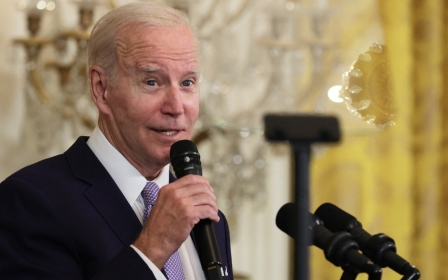War on Gaza: Senior Biden official resigns over US support for Israel

A senior political appointee at the US Department of Education announced his resignation on Wednesday citing the Biden administration's continued support for Israel's war on Gaza.
In only the second public departure from the White House over Israel's bloody offensive, Tariq Habash, a Palestinian-American Christian, said he could no longer "stay silent as this administration turns a blind eye to the atrocities committed against innocent Palestinian lives, in what leading human rights experts have called a genocidal campaign by the Israeli government."
"As a Palestinian-American - in fact, the only Palestinian-American political appointee at the Department of Education - I bring a critical and underrepresented perspective to the ongoing work on equity and justice," Habash said in his resignation letter shared with Middle East Eye.
"But now, the actions of the Biden-Harris Administration have put millions of innocent lives in danger, most immediately for the 2.3 million Palestinian civilians living in Gaza who remain under continuous assault and ethnic cleansing by the Israeli government. Therefore, I must resign."
Habash's resignation is only the second since Josh Paul, a senior State Department official who oversaw arms transfers, resigned from his post in the days after the war on Gaza began.
New MEE newsletter: Jerusalem Dispatch
Sign up to get the latest insights and analysis on Israel-Palestine, alongside Turkey Unpacked and other MEE newsletters
Habash, who served in the Department of Education as the special assistant in the Office of Planning, Evaluation and Policy Development, lamented "the dehumanization and erasure of my identity by my peers, by the media, and by my own government."
"For 75 years, my relatives have never been allowed to return to their familial homes. Millions of Palestinians have faced decades of occupation, ethnic cleansing, and apartheid, and the Biden Administration’s passive acceptance of this status quo is wholly out of line with democratic values," the letter said.

"Our government continues to provide unconditional military funding to a government that is uninterested in protecting innocent lives."
The Biden administration has continued to support Israel's campaign in Gaza and has resisted calls for a ceasefire, despite the near three month offensive killing more than 22,000 Palestinians, displacing more than 80 percent of the population and creating a humanitarian disaster in the densely populated enclave.
Middle East Eye reported in October that State Department officials were preparing a draft dissent cable calling for an immediate cessation of hostilities in Israel, Gaza, and the occupied West Bank.
The cable also demanded the US government promote truthful and balanced public messaging towards resolving the crisis.
Sources have told MEE that within both the administration as well as Congress, tensions over the last few months have been at a fever pitch, as officials have been growing increasingly frustrated with Biden's stance on the war.
On 9 November, more than 500 alumni of the Biden election campaign penned a letter demanding a ceasefire.
A month later in early December, a group of White House interns sent a letter to Biden himself, saying they could "no longer remain silent on the ongoing genocide of the Palestinian people" and called for a permanent ceasefire in Gaza.
While interns have little say over issues like foreign policy, the letter's strong language and inclusion of words such as "genocide" indicated a sharp disapproval of Biden's stance.
"I cannot be quietly complicit as this administration fails to leverage its influence as Israel’s strongest ally to halt the abusive and ongoing collective punishment tactics that have cut off Palestinians in Gaza from food, water, electricity, fuel, and medical supplies, leading to widespread disease and starvation," Habash said in his letter.
Biden's Israel support increasingly unpopular
In addition to the growing dissent from within his administration, Biden is facing discontent from his own political party and the American public over his approach to Israel's war on Gaza.
The Biden administration has repeatedly said it is advising Israel on how to minimise civilian casualties. However, as the death toll of Palestinians continues to rise, the US is also fast-tracking weapons shipments to Israel.
'The actions of the Biden-Harris Administration have put millions of innocent lives in danger'
- Tariq Habash, Biden political appointee
The Biden administration has twice used an emergency authority to bypass congressional review and send artillery and munitions to Israel. This specifically has raised concerns from Democratic lawmakers, who put out statements opposing Biden's moves to forgo congressional authority on arms sales.
The US was also the sole country to veto a UN Security Council resolution calling for a ceasefire in Gaza, a demand supported by the majority of the council as well as dozens of other nations. Washington's defending of Israel at the UN has led to growing isolation with the majority of the international community on the position of the Gaza war.
Public opinion polls in the US have also indicated Biden's approach is unfavourable, especially among young Americans.
A survey conducted by The New York Times found that half of young Americans believe Israel is intentionally killing civilians in Gaza, while 70 percent of them disapprove of how Biden is handling the conflict.
Middle East Eye delivers independent and unrivalled coverage and analysis of the Middle East, North Africa and beyond. To learn more about republishing this content and the associated fees, please fill out this form. More about MEE can be found here.




